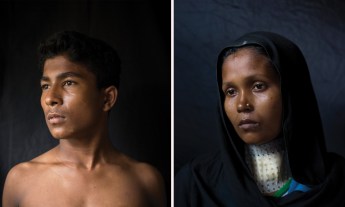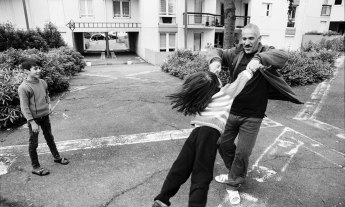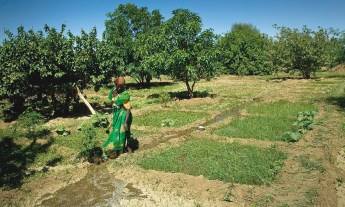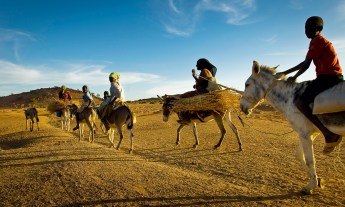
What do you say when you see your mother and father so many years after being separated from them during the massacre in Rwanda? Clemantine Wamariya, now a human rights advocate, has lived through this surreal experience.
In 1994, Clemantine Wamariya, 6, and her sister Claire, 15, fled the Rwandan massacre, became separated from their parents, and migrated through seven African countries in search of safety — perpetually hungry, enduring and escaping refugee camps, finding unexpected kindness, witnessing inhuman cruelty. When Clemantine was 12, she and her sister were granted refugee status in the US, where their lives diverged. Claire was a single mother struggling to make ends meet in Chicago, while Clemantine lived Monday through Friday with the Thomas family in a wealthy suburb where she went to school. In 2006, the sisters were invited to appear on Oprah after Clemantine was named a winner of Oprah’s high school essay contest, in which competitors wrote about Elie Wiesel’s Night and why it was still relevant.
In this nice studio, in front of all these well-dressed people, Oprah’s team played the video of Oprah and Elie Wiesel walking arm in arm through snow-covered Auschwitz, discussing the Holocaust. Then the producers gave us a break. We sat in silence. Some of us were horrified and others were crying.
But then Oprah said, “So, Clemantine, before you left Africa, did you ever find your parents?”
After that, Oprah said glowing things about all the winners of the essay contest except me. I told myself this was fine. Fine. I hadn’t really gone to school until age 13, and when I was 7 I’d celebrated Christmas in a refugee camp in Burundi with a shoebox of pencils that I’d buried under our tent so that nobody would steal it. Being in the audience was enough, right? Plus, I kept wanting to say to Oprah: Do you know how many years, and across how many miles, Claire has been talking about meeting you?
But then Oprah said, “So, Clemantine, before you left Africa, did you ever find your parents?”
I had a mic cord tucked under my black TV blazer and a battery pack clipped to my black TV pants, so I should have suspected something like this was coming.
“No,” I said. “We tried UNICEF . . . , we tried everywhere, walking around, searching and searching and searching.”
“So when was the last time you saw them?” she asked.
“It was 1994,” I said, “when I had no idea what was going on.”
“Well, I have a letter from your parents,” Oprah said, as though we’d won a game show. “Clemantine and Claire, come on up here!”
A year earlier, Claire and I had learned that our parents were still alive. They now lived in a shack on the outskirts of Kigali. We talked to them on the phone sometimes, but only rarely because — how do you start? Why didn’t you look harder for us? How are you? I’m fine, thanks.
Claire held on to me. She was shaking, but she kept on her toughest, most skeptical face, because she knows more about the world than I do, and also because she refused to think, even after all we’d been through, that anybody was better or more important than she was. When we were dirt poor and alone, she’d be in her seventh hour of scrubbing someone’s laundry by hand and she’d see on a TV an image of Angelina Jolie, swaggering and gleaming, radiating moral superiority, and even then Claire would say, “Who is that? God? You, you’re human. Nothing separates me from you.”
One of the most valuable skills I’d learned while trying to survive as a refugee was reading what other people wanted me to do.
I have never been Claire. I have never been inviolable. Often, still, my own life story feels fragmented, like beads unstrung. Each time I scoop up my memories, the assortment is slightly different. I worry, at times, that I’ll always be lost inside. I worry that I’ll be forever confused. But that day I leapt up onto the set, smiling. One of the most valuable skills I’d learned while trying to survive as a refugee was reading what other people wanted me to do.
“This is from your family, in Rwanda,” Oprah said, handing me a tan envelope. She looked solemn, confident in her purpose. “From your father and your mother and your sisters and your brother.”
I opened the envelope and pulled out a sheet of blue paper. Then Oprah put her hand on mine to stop me from unfolding the letter. It was a huge relief. I didn’t want to have a breakdown on TV.
“You don’t have to read it right now, in front of all these people,” Oprah said. “You don’t have to read it in front of all these people . . .” She paused. “Because . . . because . . . your family . . . IS HERE!”
In Malawi, I used to write my name in dust on trucks, hoping my mother would see my loopy cursive and realize that I was alive.
I started walking backward. Claire’s jaw unhinged in a caricature of shock. Then a door that had images of barbed wire on it — created especially for this particular episode, I assume, to evoke life in an internment camp — opened stage right and out came an eight-year-old boy, who was apparently my brother. He was followed by my father, in a dark suit, salmon shirt and tie; a shiny new five-year-old sister; my mother in a long blue dress; and my sister Claudette, now taller than me. I’d last seen her when she was 2 years old and I still believed my mother had picked her up from the fruit market.
I’d fantasized about this moment so many times. In Malawi, I used to write my name in dust on trucks, hoping my mother would see my loopy cursive Clemantine and realize that I was alive. In Zaire, I’d saved coins so I could buy my parents presents. In Tanzania, I’d collected marbles for my older brother, Pudi, who wasn’t there for this reunion. Pudi was dead.
Claire remained frozen for a moment. So I, in my TV clothes and blown-out hair, ran toward my Oprah-produced family, arms outstretched. I hugged my brother. I hugged my father. I hugged my tiny little sister. I hugged my mother, but my knees gave out and she had to pick me up. Then I hugged her. I hugged Claudette, my little sister, little no more. I walked across the stage and hugged Oprah. I hugged lovely, weathered Elie Wiesel.
My mother kept sitting down and standing up and touching everything, while my father kept smiling, as though someone he mistrusted were taking pictures of him.
A few hours later, though it seemed like minutes, we found ourselves on the sidewalk outside the studio, and my family took a black limo north to my sister’s apartment. Nobody talked in the car. In the apartment, nobody knew what to do either. My mother kept sitting down and standing up and touching everything — the living room walls, the TV remote — and singing about how God had protected us and now we must serve and love him. My father kept smiling, as though someone he mistrusted were taking pictures of him. Claire remained nearly catatonic: rocking, stone-faced. I thought she’d finally gone crazy, for real.
I sat on Claire’s couch, looking at my strange new siblings, the ones who’d replaced me and Claire. They looked so perfect, their skin unblemished, their eyes alight, like an excellent fictional representation of a family that could have been mine. But they didn’t know me and I didn’t know them, and the gap between us was a billion miles wide. I fell asleep crying on Claire’s daughter’s bed and woke still wearing my Oprah shoes.
The next day was Friday. Of course, I didn’t go to school. We needed to start making up for so much lost time. Yet I couldn’t look at my parents — they were ghosts. I felt gratitude, yes. Oprah had brought my parents to me. But I also felt kicked in the stomach, as though my life were some psychologist’s perverse experiment: Let’s see how far we can take a person down, and then how far we can raise her up, and then let’s see what happens!
Saturday, my family, along with my host family the Thomases, drove to the Chicago Botanic Garden, where we stared at the Illinois lilies and roses. We all wanted these to be beautiful links to the lilies and roses in Kigali, threads knitting this present to that past, but everything was awkward, and it felt as though cameras were still following us around. Sunday we did Navy Pier — the gaudy Ferris wheel, the sticky cotton candy, all the tourist stuff.
My father kept smiling his fake, pained smile. Mine probably looked the same: a smile covering a scream. Claire barely said a word. Monday morning, my parents and new siblings left on the flight back to Rwanda, and Mrs. Thomas picked me up as usual at Claire’s apartment. I had no idea how to make sense of what had just happened. So I just ran out to her Mercedes and she dropped me off at school.
Excerpted from the new book The Girl Who Smiled Beads: A Story of War and What Comes After by Clemantine Wamariya and Elizabeth Weil. Published by Crown, an imprint and division of Penguin Random House LLC, New York. Copyright © 2018 by Clemantine Wamariya.











